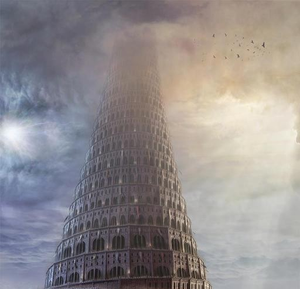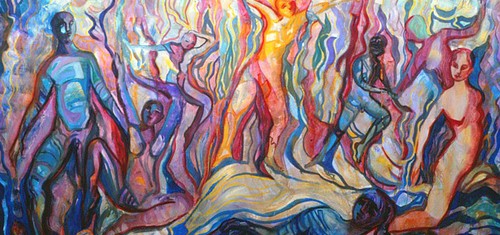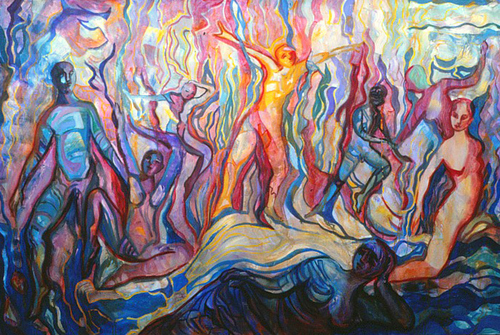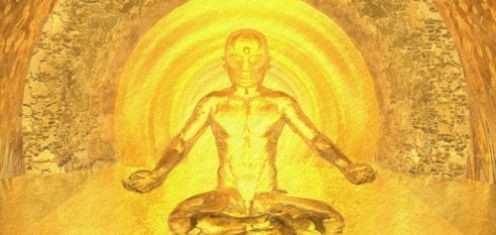I wanted to believe that this might be the only blog in town this week not about Osama or Obama. That I wouldn’t write a tome about “to kill a killer” or “to gloat or not to gloat.” Yet, in the end, it’s all really about the meaning of life, anyway. I’m talking about BIG stuff, here. I’m talking about THE POINT.
What’s the point?
And I’m not coming from that nihilistic, black nail polish kind of place. I’m coming from that stare into the mirror and sigh sort of place.
It seems like back “in the really old days” people had basic survival to contend with more than anything. Hunt, gather, and/ or grow food and do ones best to protect the family from marauders and generally bad people. Also likely was the added concern with the fate of one’s body, mind and spirit in the assumed or hotly debated afterlife.
Today, we’re still concerned with the procurement of food ( I mean, who doesn’t like a cold Coca Cola) and self-protection (could I ever build a wall high enough), however these basic needs are often overshadowed by the pursuit of new technology (patiently, peacefully waiting for the IPhone 5), preparing for retirement (what does that really mean in this day and age) and where and when we will take our next vacation (when did we need a fancy term for staying home instead of going somewhere else).
Back in the day when folks were primarily concerned with the survival of self and soul, do you think they felt an overarching sense of meaning in their lives? Do you think they felt connected to the rest of the planet; a kinship with other humans? Even without CNN? Makes me wonder…
When faced with my survival, is there really significant emotional and physical space to worry about the existential nature of meaning and purpose?
 Today there are surely billions of people who are still concerned with their souls in the afterlife and who derive a sense of meaning from their respective religions or beliefs. Yet, I am unsure as to whether there is a unifying, universally coherent, common purpose for us all; something that draws us all together. Was the notion of the Tower of Babel (one of my favorite parables) merely about language or was there a deeper, existential notion of DIFFERENCE?
Today there are surely billions of people who are still concerned with their souls in the afterlife and who derive a sense of meaning from their respective religions or beliefs. Yet, I am unsure as to whether there is a unifying, universally coherent, common purpose for us all; something that draws us all together. Was the notion of the Tower of Babel (one of my favorite parables) merely about language or was there a deeper, existential notion of DIFFERENCE?
One would think the condition of our environment would have accomplished a unification for our species long ago yet the fact that the nations of the world can’t seem to work together to solve global warming is an indication of our state of affairs. We still remain scattered across the earth doing our own thing. Some countries still consider global warming an Other issue as a matter of public policy.
Then there is, of course, the issue of doctrine, dogma and subjective truth. The marauders attacking my village thousands of years ago believed they were justified in attacking my village even though I strongly disagreed. I mean, I REALLY disagreed with the essential premise of their approach to life.
Many of us today are in favor of free speech and democratic process until someone threatens us for real. When marauders come rolling through my sense of peace and calm, I want to stop them by any means necessary because I’m still basically a human being who doesn’t care about you until you make changing me and altering my agenda, your agenda. Then we have a problem, man.
The notion of that primordial tower was for all the nations of the earth to band together for a common end and build a structure so amazing that we could reach God, thus becoming Gods. However, that scoundrel God “confounded the language of all the Earth.” (Genesis 11:5-8) and set us back a ways. Now look at us.





 Not dissimilar has been the environmental snow job on the planet…
Not dissimilar has been the environmental snow job on the planet…  However, when an
However, when an 

 Put down the dream dictionaries. You’ve probably come across dream dictionaries that feature specific meanings for objects. As Sumber notes, while there may be some universal meaning for these symbols, the key is to figure out what the dream means to you.
Put down the dream dictionaries. You’ve probably come across dream dictionaries that feature specific meanings for objects. As Sumber notes, while there may be some universal meaning for these symbols, the key is to figure out what the dream means to you.


 Jeffrey Sumber is changing the world, one relationship at a time. For over two decades, Jeffrey has worked to understand the human experience from as many angles as possible. As a successful psychotherapist, marriage counselor, and life coach, Jeffrey has worked with thousands of clients who strive to live their best lives.
Jeffrey Sumber is changing the world, one relationship at a time. For over two decades, Jeffrey has worked to understand the human experience from as many angles as possible. As a successful psychotherapist, marriage counselor, and life coach, Jeffrey has worked with thousands of clients who strive to live their best lives.